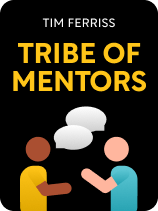

This article is an excerpt from the Shortform book guide to "Tribe of Mentors" by Tim Ferriss. Shortform has the world's best summaries and analyses of books you should be reading.
Like this article? Sign up for a free trial here.
Why isn’t comedian and actor Patton Oswalt afraid to take risks? What gives filmmaker David Lynch creative freedom?
All of the world’s most successful people have this in common: They’ve failed. Regardless of who you are, failure happens. But, those who find success have first found a way to leverage failure. Tim Ferriss shares the advice he got from several people about how to use failure as a springboard to success.
Read more to learn three benefits of failure that successful people recognize.
3 Benefits of Failure
If you choose to pursue work you’re passionate about, you’re likely to experience some failure along the way. What’s the best way to handle these failures? Ferriss’s experts explain that, to push through them, you just need to focus on the benefits of failure:
- Benefit #1: Failure Teaches You
- Benefit #2: Failure Pushes You to Get Creative
- Benefit #3: Failure Gives You Freedom
Let’s discuss each of these benefits in more detail.
Benefit #1: Failure Teaches You
Physician Gabor Maté (When the Body Says No) asserts that failure shows you how to improve yourself. Being fired from his job as a medical coordinator helped him discover that he was far more self-absorbed and less personable than he had realized. This prompted him to improve himself and find success in his next job. Similarly, CrossFit athlete Mathew Fraser lost a championship that he was certain he would dominate, which taught him he was prideful and complacent. This motivated him to work harder, allowing him to win the championship the next year.
(Shortform note: In Ego Is the Enemy, Ryan Holiday describes a common trap that prevents people from learning how to improve themselves. If the outcome of their effort is positive overall, people often overlook the mistakes they made along the way—little failures that didn’t cause severe consequences initially, but could easily sabotage future efforts if repeated. To prevent this, Holiday recommends looking for room for improvement in your victories as much as your failures. If Maté had been looking for ways to do his job better before being fired, or if Fraser had sought ways to improve during his successful training before the championship, they could have averted their failures.)
Benefit #2: Failure Pushes You to Get Creative
Some of Ferriss’s experts assert that failure is valuable because it forces you to respond in creative ways. These creative solutions often yield unique results since other people likely haven’t tried them before. Bodybuilder and acrobat Jon Call recounts how a severe ankle sprain caused him to train in ways that didn’t rely on his legs—specifically, using gymnastic rings. This gave him unique experience and pushed his skills in new directions he otherwise wouldn’t have chosen.
Similarly, burlesque performer and entrepreneur Dita Von Teese describes how her failure to become a ballerina forced her to forge an alternate path to the lifestyle she wanted. She had to think of a way into the elegant side of show business that didn’t require memorizing and executing intricate choreography—a limitation that inspired her to start performing burlesque. Von Teese contends that this adaptation made her unique and allowed her to have a greater impact on the world.
(Shortform note: Although failure can put you on a unique path to success, some say that you don’t need to be one-of-a-kind to be a success. In Girl, Stop Apologizing, Rachel Hollis argues that treading a similar path to people who came before you is a respectable way to impact the world, too. Even if you’re the second—or five hundredth—person to accomplish something, you’re doing something good for the world that otherwise wouldn’t have happened. If Call was a less acrobatic bodybuilder and Von Teese only danced in the backgrounds of ballets, they still would have made a difference in the world. Instead of using the success of others as an excuse not to try, use their success as a roadmap to guide yourself.)
Benefit #3: Failure Gives You Freedom
Comedian and actor Patton Oswalt argues that devastating failure is valuable because it gives you freedom from fear. After you fail, time passes and you realize that almost no failure has major permanent consequences. This reveals that there’s nothing to be afraid of, giving you the courage to risk failure again and improve your skills.
(Shortform note: In The 4-Hour Workweek, Tim Ferriss argues that by rationally considering beforehand how specific failures won’t have permanent consequences, you can reduce your fear of failure and gain the courage to act without needing to experience that failure firsthand. To this end, he recommends an exercise he calls “fear-setting”: Identify the worst-case scenario of a failure, make a plan for how you would fix it, and estimate how likely a negative outcome would be. After reflecting, you’ll often find that the worst-case scenario you’re afraid of is easily fixable and is less likely to come to pass than you think.)
Additionally, filmmaker David Lynch contends that failure gives you freedom from all creative constraints. After a massive failure, you have nothing more to lose, allowing you to create whatever your heart desires. This creative freedom is a source of pure joy.
(Shortform note: On the other hand, some experts argue that creating art without any constraints is undesirable. When you’re allowed to create anything, you often lack the inspiration to make anything at all, as you have too many options to pick from and become paralyzed by this overwhelming choice. In contrast, trying to create something that fits within certain parameters—for instance, a filmmaker trying to convey deep philosophical thoughts in a form that’s appealing to mass audiences—can be a fun challenge. You may find it even more enjoyable than exercising total creative freedom.)

———End of Preview———
Like what you just read? Read the rest of the world's best book summary and analysis of Tim Ferriss's "Tribe of Mentors" at Shortform.
Here's what you'll find in our full Tribe of Mentors summary:
- Distilled life advice from over 130 world-class experts in various fields
- How to navigate non-traditional career paths, appreciate failure, and more
- Why you should allow a small amount of measured chaos in your schedule






